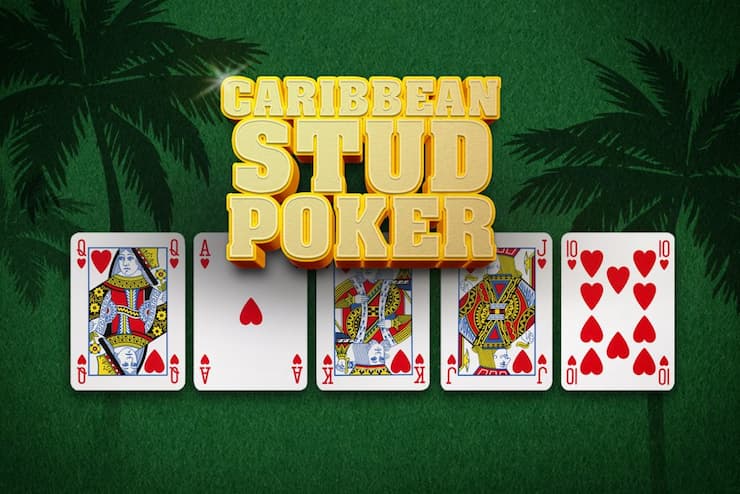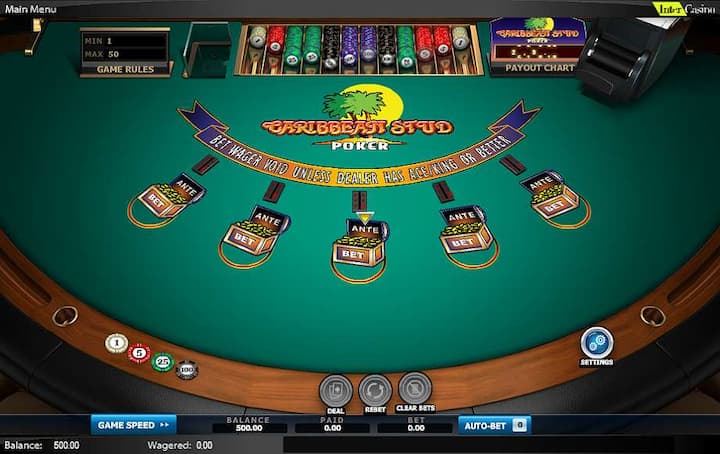Caribbean Stud Poker is a variation of traditional five-card poker, and it’s a simple and enjoyable game to play. In this quick guide on how to play Caribbean Stud Poker, you’ll find everything you need to get started: rules, odds, payouts, as well as basic strategies and useful tips to quickly get you comfortable with the game and give you the best possible start at the tables.
What is Caribbean Stud Poker?
Caribbean Stud Poker is a popular casino game based on a variant of poker called five-card stud. Unlike regular poker, it is played against the house, not other players. It is a quick and easy game with a single betting round that can be enjoyed by both new and experienced players. So, if you know how to play 3 Card Poker and other table games, you’re going to love Caribbean Stud.

Caribbean Stud History
The growing popularity of poker prompted casinos to create games based on poker. David Sklansky, a well-known poker player and author, claims to have devised the game in 1982, originally calling it Casino Poker. However, his version differed slightly from Caribbean Stud as we know it today, which was first played at the King International Casino in Aruba in the 1980s.
The game’s popularity grew in the mid-to-late 1980s after introducing the progressive jackpot, which enabled big payouts for the highest hands. While other forms of poker have surpassed five-card stud in traditional poker games, Caribbean Stud Poker has become a staple in both live and online casinos around the world. Many casinos in their gaming sections offer Caribbean Stud Poker (often listed as Caribbean Poker online).
How to Play Caribbean Stud Poker – a Step-by-Step Guide
Caribbean Stud is a fairly simple game to learn, allowing a new player to quickly get into action at a casino or even on real money poker apps. In this section, we take a look at the Caribbean stud poker rules with a step-by-step breakdown of everything that happens in a single hand of the game.
Step 1: The Ante and the Jackpot Wager
Play starts with each player posting an initial bet called the ante. Online casinos typically offer the game at a wide range of stakes (for example, from $1 to $100 ante), while in-person casinos have a higher minimum ante, usually $5 or $10.
Players can also make an additional side bet, also called a jackpot bet. This bet pays for the participation in the progressive jackpot, which awards a share of the collected jackpot prize pool when a player makes the strongest hands, such as a royal flush or a straight flush. The jackpot wager is often $1, regardless of the stakes being played. Still, some casinos (especially online) offer a wider range of jackpot bets and pay out a multiplier of the wager for made high hands.
Step 2: The Deal
After placing the antes and the optional jackpot bet, each player and the dealer are dealt five cards. The dealer’s hand is dealt last, with one card face up. Players are allowed to look at all their cards immediately, but are not allowed to show them to other potential players at the table.
Step 3: The Betting Round
Based on the dealer’s cards and their own, a player then decides to either fold or raise (sometimes a raise is also referred to as a ‘call’ or ‘play’). A raise is always double the ante.
For example, if you are playing at a Caribbean Stud Poker table with a $10 ante, you must now raise $20 more to continue, making your total wager $30 (or you can fold and lose your $10 ante).
Step 4: The Showdown
Once all players have either raised or folded, the cards are revealed. First, it’s necessary to determine whether the dealer has a qualifying hand, which is a minimum of Ace-King or better.
Here are the four possible outcomes of a hand of Caribbean Stud Poker:
1. The dealer’s hand doesn’t qualify
If the dealer fails to make an Ace-King high hand, each player still in the hand receives even money on the ante, while their raise is returned. For example, if the ante is $10, you get back your $20 raise, and double your $10 ante—totaling $40 for a $10 profit.
2. The dealer’s hand qualifies and beats your hand
If the dealer has at least an Ace-King high hand and their hand is better than yours, you lose all your bets.
3. The dealer’s hand qualifies, and you have the same hand as the dealer
In this case, all bets are returned, and you have no win or loss on the hand.
4. The dealer’s hand qualifies, and you beat the dealer’s hand.
This is the best case scenario: you receive even money on the ante, while your raise is paid based on the strength of your hand, and the payouts are determined in advance by the casino, as shown in the table in the next section.
Caribbean Stud Poker Hand Rankings and Payouts
The hands in Caribbean Stud are ranked the same in most ‘high hand’ games, which you can see on our hand rankings poker cheat sheet.
The rankings go from a high-card hand (a hand that has not made a pair or better, for example, A-K-J-8-4) to a Royal Flush. All possible hands and their strengths are ranked in descending order in the table below.
While there may be slight differences between various casinos, in the U.S., the payouts in Caribbean Stud Poker typically look like this:
| Poker Hand | Caribbean Stud Poker Payout | Odds against Making the Poker Hand |
|---|---|---|
| Royal Flush | 100 to 1 | 649,739 to 1 |
| Straight Flush | 50 to 1 | 72,192 to 1 |
| Four-of-a-kind | 20 to 1 | 4,165 to 1 |
| Full House | 7 to 1 | 693 to 1 |
| Flush | 5 to 1 | 509 to 1 |
| Straight | 4 to 1 | 254 to 1 |
| Three-of-a-kind | 3 to 1 | 46 to 1 |
| Two Pair | 2 to 1 | 20 to 1 |
| One Pair | 1 to 1 | 2.37 to 1 |
| No Pair (High Card) | 1 to 1 | 0.99 to 1 |
Progressive Jackpot Payouts in Caribbean Stud Poker
In most casinos, a player wins the entire progressive jackpot pool (100%) if they make a royal flush, while a straight flush typically awards you 10% of the prize pool (though sometimes it is a flat rate or a multiplier of your jackpot wager).
If you make a flush, a full house, or four of a kind, you also usually receive a prize from the jackpot pool, which is either a flat rate payout or a multiplier of your jackpot bet. These payouts differ between casinos. A common payout in the U.S. for a 1$ jackpot bet is $50 for a flush, $100 for a full house, and $500 for four of a kind.
The outcome for the jackpot bet does not depend on whether the dealer’s hand qualifies, and there is no need to beat the dealer’s hand. In every hand, you receive a prize if you hit a jackpot hand and lose the jackpot wager if you don’t.

Caribbean Stud Poker Strategy
There are a few simple strategy rules you can follow that will significantly improve your odds against the house.
The first two simple Caribbean stud poker rules to remember are:
1. Raise with any pair or better.
2. If you have worse than A-K, fold.
If you hold an Ace-King high-hand, the decision becomes more complicated – your play will depend on the dealer’s visible card and your other cards. Here are three more useful rules that apply to your Ace-King hands:
3. If the dealer’s card is 2-Q and the card matches one of your cards, raise with your A-K hand.
4. If the dealer’s card is 2-Q and it is worse than your fourth-highest cards, also raise.
5. If the dealer’s card is an Ace or a King, raise if you also hold a Queen or a Jack.
A precise optimal Caribbean Stud Poker strategy is more complicated and requires a lot of detailed analysis and memorization. However, the simple rules above are already enough to reduce the house edge significantly. For example, if we raised every hand, the house would have an edge of 16.5 %. But if we are selective with our hands, following just those simple rules, this reduces the house edge to about 5.2 %.
As always with casino games, it is advisable to decide in advance when you plan to leave the table, perhaps defining a stop win. A stop loss is also sensible to make sure we don’t spend more than we can afford. If we hit a bad run, moving to lower stakes may preserve our bankroll and keep us in the games longer.
Conclusion
Caribbean Stud Poker is easy to learn and fun game you can easily include in your play at the local or online casino. While the house holds an edge, using a smart strategy and managing your bankroll well can help you enjoy the game. Now that you know this game’s rules, payouts, and tips, you can take a confident seat at the tables.
FAQs
What is the 5 1 bonus in Caribbean stud poker?
How does Caribbean Stud Poker work?
What are the odds of winning the Caribbean Stud Poker?
What is the best strategy for Caribbean stud poker?
What is the difference between Caribbean Stud and poker?
What is the best Caribbean Stud payout?
Resources
1. Cool Old Games. (n.d.). Caribbean Stud Poker. Retrieved October 23, 2024, from https://www.coololdgames.com/card-games/poker/casino/caribbean-stud/
2. Sklansky, D. (2007). I invented Caribbean Stud. Two Plus Two Forums. Retrieved October 23, 2024, from https://forumserver.twoplustwo.com/74/special-sklansky-forum/i-invented-caribbean-stud-641/






